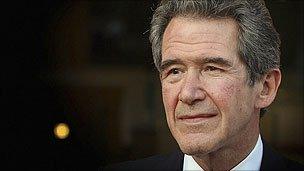Cable 'endorses' tuition fee increase plan
- Published
Vince Cable: "The policy is simply no longer feasible"
Business Secretary Vince Cable has given the government's approval to a report calling for an unlimited level of tuition fees for students.
Mr Cable told the House of Commons he endorsed the "persuasive proposals" of Lord Browne's radical funding reforms.
A backbench rebellion by Lib Dem MPs has been threatened - but Mr Cable defended the plans as "fair and progressive".
Students have warned that raising fees would mean "crippling debts".
Mr Cable told MPs that his previous pledge to scrap fees was "no longer feasible" - and that he saw Lord Browne's proposals to raise fees as "on the right lines".
Funding cuts
Accepting the "broad thrust" of the report, Mr Cable suggested that students might expect to pay fees of about £7,000 - more than double than at present - with the option of a higher level of fee.
The business secretary said he would remain "open to suggestions" while preparing a detailed response to Lord Browne's report - with the aim of implementing changes to fees by 2012.

Universities should no longer face limits on how much they should charge, says Lord Browne's report
Labour's business spokesman, John Denham, claimed that fee increases assumed a forthcoming 80% cut in teaching grants.
"It would effectively end public funding of most courses and it would put the responsibility for paying for higher education on to students alone," said Mr Denham.
The UCU lecturers' union said Lord Browne's proposals, which could see fees rising to as much as £12,000 per year, was "the final nail in the coffin for affordable higher education".
Accepting the main proposal of Lord Browne, that the limit on fees should be lifted, presents deep political difficulties for the Liberal Democrats.
Fee pledge
The party's MPs, including Mr Cable, signed a pledge at the election to vote against any increase in fees.

Nick Clegg and Julian Huppert MP with their fee pledges. Mr Huppert is still opposed to raising fees.
Party leader, Nick Clegg, made a video for students in which he delivered a personal message saying that tuition fees were "wrong" and that he would oppose them.
The press office of Mr Cable's own party said it remained official policy to scrap fees.
Mr Cable still faces the challenge of heading off a rebellion by backbench Lib Dem MPs.
BBC political editor Nick Robinson said that Lib Dems had long feared the day when, as coalition partners, they would have to rip up their own party's pledges. But he said that he had been told by a senior Lib Dem following the announcement that "the day had come, but the sky had not fallen in".
The party's deputy leader Simon Hughes challenged Mr Cable to explain how disadvantaged youngsters would not be deterred by such charges.
Students have warned they will challenge MPs who "betray" their election pledge.
But Mr Cable sought to highlight divisions on fees within the Labour party - quoting the opposition of Shadow Chancellor Alan Johnson to graduate taxes.
Free market
The blueprint for universities in England set out by Lord Browne would see a new emphasis on competition.
It calls for the current £3,290 cap on fees to be scrapped and replaced by a free market, in which universities set their own charges for different courses.

Lord Browne outlines a competitive system in which universities could be taken over or shut down
But Lord Browne's review, external proposes that universities that charge more than £6,000 a year would lose a proportion of the fee to help cover the cost of student borrowing.
Lord Browne said: "We have taken off the cap but we haven't taken off the restrictions."
He said all universities were different and needed different amounts of money, but he predicted that few would put fees very high.
He acknowledged graduates would be paying significantly more back in their tuition fee and maintenance loans but insisted they were not being left with "mortgage-style debts".
"They would be paying the same interest rate as the government uses to borrow. They will only pay it back when their earnings go above £21,000," he said.
The report comes ahead of next week's comprehensive spending review, in which major cuts to higher education funding are expected.
Lord Browne sets out a system in which much of the cost of a degree would be transferred from the taxpayer to the student.
Universities 'could close'
This more competitive market would also mean that for the first time universities could go out of business.
Students from the University of Birmingham give their views on unlimited fees
Universities must compete over students, fee levels and against new providers, the review panel recommends: "If they fail... they might ultimately close or be taken over."
The report seeks to balance higher charges with support for applicants from poorer families.
As now, students would not have to pay fees up-front, but would receive a loan.
But they would not have to start repaying until their earnings reached £21,000 per year, up from the current level of £15,000.
All students will be able to borrow £3,750 per year - and young people from families earning less than £25,000 will receive an additional grant of £3,250.
There have been warnings that middle-income families will face a particular financial squeeze from such a fee hike.
"There is a feeling that the rich can afford it - and the poor will quite rightly be protected - but people in the middle could find themselves really penalised," says Justine Roberts of the Mumsnet website.
If accepted by the government, the reforms are expected to take effect in 2012 at the earliest.
Paul Marshall, executive director of the 1994 Group of research-intensive universities, welcomed the review as "the first progressive step" towards increasing funding for universities.
But the Million+ group of new universities said it would deter poorer students, and would "undoubtedly mean that some students who would have gone to university will decide not to go".
The Russell Group of leading universities said the higher charges would provide necessary extra income.
"That's because, bluntly, our leading institutions will not be able to compete with generously-funded universities in other countries if they are not able to secure extra funding."
The National Union of Students said students would be left with "crippling levels of debt and many universities face utter devastation as a result of horrific cuts".
Elsewhere in the UK, Scottish students studying in Scotland do not have to pay any fees. In Northern Ireland and Wales, fees are charged up to a maximum of £3,290 a year.